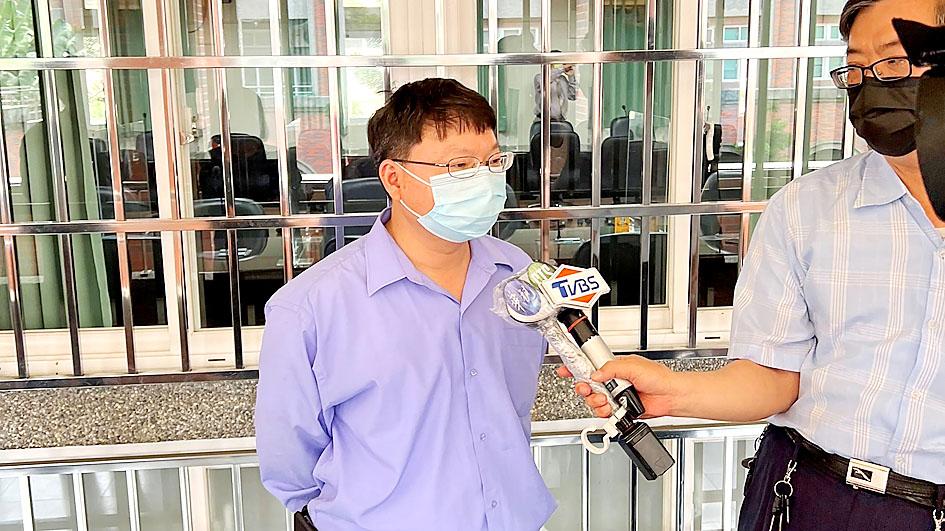The Ministry of Education has banned Kao Yuan University from enrolling overseas students for the next academic year, after students complained of being forced to work excessive hours in jobs unrelated to their studies.
Democratic Progressive Party Legislator Fan Yun (范雲) and Taiwan Labour Front secretary-general Son Yu-liam (孫友聯) yesterday hosted a news conference at the legislature in Taipei to present the complaints brought by two Philippine students.
The students in the university’s international bachelor program of industry-university cooperation last month called the Ministry of Education’s hotline for overseas students, saying that the internship program was inappropriate, and that the school had told them to lie about only working 20 hours per week — the legal limit.

Photo courtesy of Kao Yuan University
“When I came to Taiwan, I expected my life as a student would be to study, do internships related to my study and do part-time jobs on the side, but it did not turn out to be like that,” one student said. “My whole life in Taiwan has been in chaos and misery.”
“Due to the hard labor that the school arranged us to do, I cannot focus on studying because my body is tortured,” she said, adding that they had to work more than 40 hours per week to afford their tuition.
The students said that the university was aware that many students worked more than 12 hours per day, but asked them to lie if they were ever asked about it.
The ministry said it met with the students and interviewed other foreign students at the school.
The ministry asked the university to assist the students in switching to other programs to complete their studies, it said.
The students gave the ministry an audio recording that they said proved they were instructed in a class to claim that they worked only 20 hours per week, Department of Technological and Vocational Education deputy head Eric Ker (柯今尉) told the Central News Agency.
The ministry said it would place the university under supervision and consider the issue when granting subsidies to private schools.
The university told a news conference in Kaohsiung that one of the students could not adapt to the internship program and the work environment, and asked to change the internship 13 times.
The student also reportedly asked to fulfill the internship requirement by working part-time in the service industry, which the university denied, as it is against regulations, it said.
The school opened a one-on-one internship course for the student, who did not earn the credits due to frequent unexcused absences, it said.
The internship opportunities provided for the student were mostly the same as those of Taiwanese students, it said.
The company the student interned with denied the student’s claims of an unsafe work environment, salary deductions and daily overtime requirements.
Fan urged the ministry to closely examine the enrollment plan for overseas students to ensure that schools have qualified teachers and are able to provide appropriate internships to students.
She added that the ministry should work with labor departments to inspect schools and factories when it receives complaints.

In his National Day Rally speech on Sunday, Singaporean Prime Minister Lawrence Wong (黃循財) quoted the Taiwanese song One Small Umbrella (一支小雨傘) to describe his nation’s situation. Wong’s use of such a song shows Singapore’s familiarity with Taiwan’s culture and is a perfect reflection of exchanges between the two nations, Representative to Singapore Tung Chen-yuan (童振源) said yesterday in a post on Facebook. Wong quoted the song, saying: “As the rain gets heavier, I will take care of you, and you,” in Mandarin, using it as a metaphor for Singaporeans coming together to face challenges. Other Singaporean politicians have also used Taiwanese songs

NORTHERN STRIKE: Taiwanese military personnel have been training ‘in strategic and tactical battle operations’ in Michigan, a former US diplomat said More than 500 Taiwanese troops participated in this year’s Northern Strike military exercise held at Lake Michigan by the US, a Pentagon-run news outlet reported yesterday. The Michigan National Guard-sponsored drill involved 7,500 military personnel from 36 nations and territories around the world, the Stars and Stripes said. This year’s edition of Northern Strike, which concluded on Sunday, simulated a war in the Indo-Pacific region in a departure from its traditional European focus, it said. The change indicated a greater shift in the US armed forces’ attention to a potential conflict in Asia, it added. Citing a briefing by a Michigan National Guard senior

CHIPMAKING INVESTMENT: J.W. Kuo told legislators that Department of Investment Review approval would be needed were Washington to seek a TSMC board seat Minister of Economic Affairs J.W. Kuo (郭智輝) yesterday said he received information about a possible US government investment in Taiwan Semiconductor Manufacturing Co (TSMC, 台積電) and an assessment of the possible effect on the firm requires further discussion. If the US were to invest in TSMC, the plan would need to be reviewed by the Department of Investment Review, Kuo told reporters ahead of a hearing of the legislature’s Economics Committee. Kuo’s remarks came after US Secretary of Commerce Howard Lutnick on Tuesday said that the US government is looking into the federal government taking equity stakes in computer chip manufacturers that

CLAMPING DOWN: At the preliminary stage on Jan. 1 next year, only core personnel of the military, the civil service and public schools would be subject to inspections Regular checks are to be conducted from next year to clamp down on military personnel, civil servants and public-school teachers with Chinese citizenship or Chinese household registration, the Mainland Affairs Council (MAC) said yesterday. Article 9-1 of the Act Governing Relations Between the People of the Taiwan Area and the Mainland Area (臺灣地區與大陸地區人民關係條例) stipulates that Taiwanese who obtain Chinese household registration or a Chinese passport would be deprived of their Taiwanese citizenship and lose their right to work in the military, public service or public schools, it said. To identify and prevent the illegal employment of holders of Chinese ID cards or